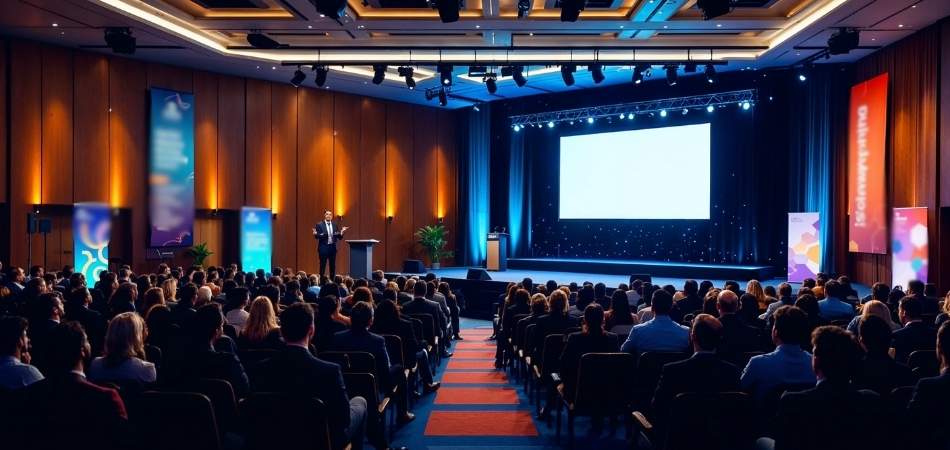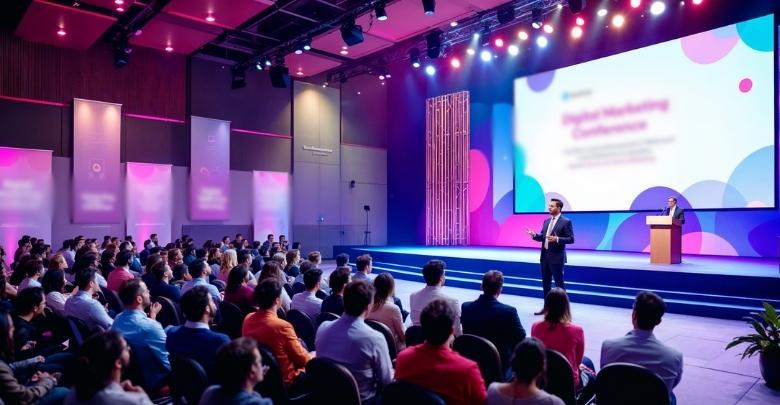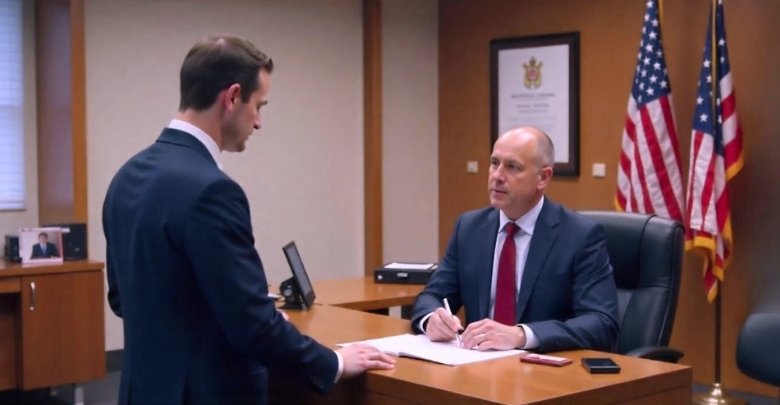The United States is a global hub for innovation, attracting practitioners and experts from diverse fields. With countless business events and conferences held yearly, millions of people come to the U.S. to network, share knowledge, and explore opportunities. After attending, many attendees consider staying longer or moving permanently to advance their careers. This raises an important question: Can I Get a U.S. Green Card After Attending a Conference?
No, attending a conference alone does not qualify you for a U.S. Green Card. You must meet specific eligibility criteria, such as family sponsorship, employment, or other categories set by USCIS. Review the Green Card eligibility categories for more information.
Throughout this article, we’ll explore the Green Card eligibility requirements in greater detail and walk you through the application process. Read on for more information about pursuing permanent residency in the U.S.
Can I Get a U.S. Green Card After Attending a Conference in the USA?
Unfortunately, no. It is not enough to attend a conference in USA to qualify for a Green Card. The U.S. government has specific eligibility rules for permanent residency. Let’s explore the key pathways available for obtaining a Green Card.

Employment-Based Green Card
Sponsorship from a U.S. employer can help you get a Green Card. Your job must be in a category approved by USCIS. The employer must file a petition on your behalf. High-demand skills or extraordinary abilities increase your chances.
Family Sponsorship
U.S. citizens and Green Card holders can sponsor family members. Spouses, children, and parents have a higher priority. Siblings may qualify but face longer wait times. Family-based petitions require proof of relationship and financial support.
Investment-Based Green Card
Investing in the U.S. can lead to a Green Card. The EB-5 program requires a minimum investment in a U.S. business. Your investment must create at least ten full-time jobs. Regional Center programs offer indirect investment opportunities.
Diversity Visa Lottery
The U.S. runs a Green Card lottery for selected countries. This program allows winners to apply for permanent residency. Only applicants from eligible countries can participate. Meeting basic education or work experience requirements is necessary.
Refugee or Asylum Status
Refugees and asylum seekers may apply for a Green Card. Applicants must prove they fear persecution in their home country. After one year in the U.S., they can apply. Strong evidence and legal support improve approval chances.
Special Categories and Humanitarian Programs
Certain individuals qualify under unique immigration programs. Victims of crime, abuse, or trafficking may be eligible. Special visas exist for religious workers and international broadcasters. Each program has different documentation and legal requirements.
How Long Can You Stay in the U.S. After a Conference?
The length of stay depends on the visa type issued before travel. A B1/B2 visa allows visitors to remain for up to six months. However, the exact duration is determined by the Customs and Border Protection (CBP) officer upon arrival.
Extensions may be possible under specific circumstances with proper documentation and a valid reason. Travelers must apply for an extension before their authorized stay expires. Overstaying can lead to penalties, visa cancellations, or future entry restrictions.
Many professionals utilize this time for networking and evaluating the impact of US conferences on their career growth. If they want to stay longer, they must explore legal options for visa adjustments. It is always a good idea to plan ahead so that you can comply with immigration rules and avoid unnecessary issues.
What Happens If You Overstay Your U.S. Visa After a Conference?
Overstaying your U.S. visa can have serious consequences. Staying past the allowed time frame may lead to penalties or visa restrictions. It’s crucial to understand the risks and how to avoid overstaying. Here’s what can happen if you stay beyond your visa limit.
Legal Consequences
Overstaying a visa is a violation of U.S. immigration laws. Authorities may issue warnings, fines, or deportation orders based on the situation. A short overstay might not have severe penalties, but repeated violations can be serious. Legal actions vary depending on the length of stay and reason for overstaying.
Ban on Future Travel
A visa overstay can result in future travel restrictions. Staying more than 180 days can lead to a three-year ban. If the overstay exceeds one year, a ten-year ban may apply. These bans make future U.S. visits difficult, even with valid reasons.
Impact on Visa Applications
Future visa applications may face increased scrutiny from immigration officials. Applicants with previous overstays may need to provide strong justifications. Consulates can deny new visa requests based on past violations. A clean immigration record improves the chances of obtaining future U.S. visas.
Difficulties in Adjusting Status
Overstaying can affect eligibility for adjusting visa status within the U.S. Most visa adjustments require lawful status at the time of application. Unauthorized stays reduce options for transitioning to long-term residency. Consulting an immigration expert can help you understand the available legal pathways.
Risk of Detention or Deportation
Authorities can detain individuals who overstay for extended periods. Deportation may result in forced removal from the country. Those deported often face difficulties returning, even for valid reasons. Legal assistance is crucial when facing potential deportation issues.
Tips on Increasing Your Green Card Chances After Attending a US Conference
You can open many doors for your career by attending a U.S. conference. While it doesn’t directly lead to a permanent residency, it can increase your chances. Here are key strategies to improve your chances of obtaining permanent residency.
Attend Conferences That Align with Your Field
Choosing the right event can enhance career opportunities. Professionals benefit from finding the right academic conference in the USA for networking. Conferences with industry leaders provide better exposure and connections. Selecting relevant events strengthens professional standing and future prospects.
Build Strong Professional Connections
Networking with professionals can create potential job opportunities in the U.S. Employers may sponsor work visas that lead to Green Cards. Attending industry events and maintaining relationships can increase your chances. Staying in touch with contacts strengthens professional credibility and opportunities.
Explore Employment-Based Visa Options
Employment-based Green Cards require sponsorship from a U.S. employer. Certain industries have a higher demand for skilled workers. Researching visa programs can help identify the best pathway. Securing a job offer increases the likelihood of sponsorship.
Consider Advanced Studies in the U.S.
Studying in the U.S. can improve eligibility for employment-based immigration. Graduates in specialized fields often qualify for work visas. Universities also offer networking opportunities with potential employers. This route increases long-term residency possibilities.
Seek Guidance from Immigration Experts
Consulting an immigration attorney can help navigate the Green Card process. Experts provide legal advice tailored to individual circumstances. Understanding eligibility criteria ensures a smooth application process. Proper guidance prevents mistakes that could delay approval.
Stay Updated on Immigration Policies
U.S. immigration laws frequently change based on policies. Staying informed helps applicants prepare better for opportunities. Knowing current rules increases the chances of submitting a strong application. Updated information ensures compliance with immigration requirements.
Most Common Reasons for Green Card Denial for USA Conference Visitors
A U.S. conference offers a lot of opportunities, but it doesn’t guarantee a Green Card. Several factors can lead to denial, even if you follow all the guidelines. The following are the most common reasons why a Green Card may not be granted to US conference visitors.
Insufficient Financial Proof
Applicants must show they can support themselves without relying on public assistance. A lack of financial stability can raise concerns for immigration officers. Bank statements, job offers, or sponsorship letters strengthen the application. Providing clear financial evidence improves approval chances.
Inaccurate or Incomplete Documentation
Submitting incorrect or missing documents can result in immediate denial. Every form must be accurate and complete before submission. Immigration officers check details carefully for any inconsistencies. Double-checking paperwork ensures compliance with immigration requirements.
Visa Overstay History
A history of overstaying a previous visa can negatively impact Green Card eligibility. Immigration authorities view overstaying as a violation of U.S. immigration laws. Repeated violations can lead to automatic denial or travel restrictions. Staying within authorized time limits helps maintain a strong application.
Lack of Strong Ties to Home Country
Applicants must prove they have strong reasons to return home if required. Weak ties raise concerns about the intention to stay permanently. Proof of property, employment, or family commitments helps establish strong ties. A well-documented case improves approval chances.
Failure to Meet Health Requirements
Applicants must pass a medical examination as part of the process. Certain health conditions or missing vaccinations may result in denial. Providing complete medical records ensures compliance with immigration health standards. Following health guidelines helps avoid unnecessary complications.
Security or Criminal Issues
Past criminal records or security concerns can lead to automatic denial. Immigration officers conduct background checks to assess applicant eligibility. Even minor offenses may impact approval chances. Ensuring a clean record strengthens your application.
Best Practices to Apply for a Green Card Through a US Citizen Spouse or Relative
Applying for a Green Card through a U.S. citizen spouse or relative can be a smooth process if handled correctly. Proper documentation and following immigration guidelines are essential for success. Here are the best practices to increase your chances of approval.
Ensure Eligibility Before Applying
Applicants must meet the relationship requirements set by U.S. immigration laws. Spouses, parents, and children of U.S. citizens qualify for faster processing. Other relatives may face longer wait times due to visa limits. Checking eligibility beforehand prevents unnecessary delays or rejections.
Prepare Strong Supporting Documents
Providing complete and accurate documents is crucial for approval. Marriage certificates, birth records, and financial proof help establish a genuine relationship. Incomplete paperwork may lead to delays or denials. Organizing documents properly ensures a smoother application process.
Demonstrate a Legitimate Relationship
Applicants must prove their relationship with the sponsoring U.S. citizen is real. For spouses, evidence includes photos, joint accounts, and communication records. Interviews may require detailed answers about the relationship’s history. Strong evidence prevents suspicion of fraudulent applications.
Follow the Proper Application Steps
Filing the correct immigration forms is necessary for approval. The U.S. citizen sponsor must submit Form I-130 for family-based petitions. After approval, the applicant must complete further steps based on location. Each stage must be completed carefully to avoid rejection.
Attend the Required Immigration Interviews
Interviews help immigration officers verify the authenticity of the relationship. Applicants and sponsors must answer questions honestly and confidently. Preparing in advance ensures clear and consistent responses. Nervousness or vague answers can raise concerns.
Stay Updated on Immigration Rules
U.S. immigration policies change frequently, affecting application processes. Checking for updates helps applicants adjust to new requirements. Consulting an immigration attorney provides valuable guidance for complex cases. Staying informed reduces the risk of unnecessary mistakes.
Frequently Asked Questions
Conferences in the United States provide excellent opportunities for professional networking and growth. However, many attendees wonder if it can lead to permanent residency. Below, we answer the most frequently asked questions about obtaining a Green Card after attending a conference in the U.S.
Does Participating as a Speaker in a Conference Help in Green Card Approval?
Being a speaker at a conference does not directly qualify you for a Green Card. However, it can strengthen your profile if you apply for an O-1 visa or an employment-based Green Card. Your expertise and recognition in the field could be valuable assets.
What Should I Do If I Want to Stay Longer for Networking?
If you need more time for networking, you can apply for a B1/B2 visa extension. You must submit Form I-539 and provide a valid reason before your current stay expires. Extensions are granted at the discretion of U.S. Citizenship and Immigration Services (USCIS).
Can I Seek Legal Immigration Advice After a Conference?
Yes, consulting an immigration attorney can help you explore your options. Legal experts can guide you on work visas, investment opportunities, and sponsorship pathways. Seeking advice early can help avoid visa violations and ensure proper documentation.
What Happens If My Visa Expires While Exploring Green Card Options?
Staying in the U.S. beyond your visa expiration can lead to legal consequences. It is crucial to maintain legal status while considering Green Card options. Overstaying can result in future visa denials or travel bans.
Does Having a Strong Professional Background Increase My Green Card Chances?
A strong professional background can improve your chances of obtaining employer sponsorship. Applicants with specialized skills or advanced degrees are often preferred. Demonstrating industry contributions and networking with potential employers can enhance your opportunities.
Last Line
Being a participant in a U.S. conference can help you establish valuable networking and career opportunities, but it does not automatically grant you permanent residency. This leads many to ask, “Can I Get a U.S. Green Card After Attending a Conference?” While attending alone is not enough, various pathways exist for those seeking a long-term stay. There are many options to choose from, such as employment-based sponsorship, family petitions, investment programs, and the Diversity Visa Lottery.
By ensuring eligibility, submitting accurate documentation, and following immigration guidelines, one can increase the likelihood of success. It is possible to be rejected if you overstay your visa or don’t provide financial proof. Staying informed about immigration policies and seeking legal guidance can help applicants make the most of the process.







